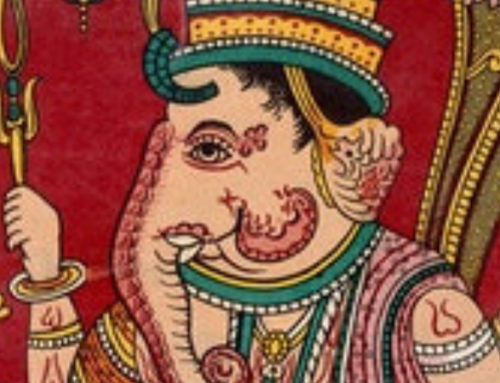Re-Possessing Yourself
My mentor Vimalananda taught that very few even among the spiritually advanced become wholly free of possession by something other than the Absolute, and that everyone else is daily being overtaken by ideas, isms, emotions, ancestors, planetary influences, diseases, poisons, and other varieties of possessing things which express themselves through us, frequently while we believe that we are acting own our own as ‘independent individuals.” (For an exhaustive guide to Indian concepts of possession, see The Self Possessed, by Prof. Frederick M. Smith.)
Today I was taking a gander at the word “possess”, which first appears in English in the late 14th century, with a meaning of “to hold, occupy, reside in” (without regard to ownership), from Old French, from Latin possidere “to have and hold, hold in one’s control, be master of, own,” which suggests is probably a compound of potis “having power, powerful, able” (from the proto-Indo-European root -*poti- “powerful; lord;” see potent) + sedere, from the proto-Indo-European root *sed- (1) “to sit.” (The Sanskrit word pati means “lord, master”). Possession (which is nine points of the law) thus happens when a potent being sits in a location and displays its lordship there.
It seems curious to me that “possessed” meaning “held as property” surfaces in English c. 1500, a mere three decades before the 1530s when “possessed” came also to have its “demonic” sense. It’s almost as if, as Englishmen of that day turned their attention toward identifying themselves with increased tenacity as the possessors of property, they opened themselves significantly further to being “tenanted” (often unwillingly) by tormenting ideas/thoughts/personalities.
People today have magnified the problem by adding dependency to (among other things) social media, reality TV and sugar to the list of classical addictions, and it does seem to be the case, now especially, that serious fixity in one facet of life often opens a human to becoming noteworthily unstable in another (or sometimes that very same) aspect. An idée fixe or “fixation” is a “preoccupation” of the mind (an idea that “occupies” the mental terrain), firmly resistant to any attempt to modify it, a notion held so inflexibly that it leapfrogs from being the mind’s tool to becoming its master.
I feel that the first step in evicting the freeloaders who are parasitizing our prana and driving us around like automata is for each of us to determine what it is that we are being possessed by. Merely naming those Seizers reduces their influence over us, by providing an awareness of our non-identity with them; that awareness can then be employed to commit to appropriate upaya (remedy) and niyama (self-imposed restriction) to restructure oneself. A healthy daily routine to help one control vata and remain grounded, involving meditation, good diet, and attention to the circulation of prana can assist us to maintain vigilance in this regard by honing the intuition and facilitating our ability to detect a ‘re-possession’ as soon as possible.
A more advanced approach is to evict the entities that have squatted within us and replace them with more desirable occupants. Today as the full moon rises in the nakshatra (lunar mansion) of Ashlesha, whose associated deity is the semi-divine Naga serpent, which represents the deeper currents of our being, may all of us strive seriously to unearth our buried patterns and work through them for the betterment of all beings. Vimalananda actively opened his own self to temporarily occupancy by deities and deceased saints, and each of us can do something similar (if less dramatic) by replacing these thieves of awareness with the sweet name of the Supreme: always available, never failing, ever satisfying. Om namah sivaya!


